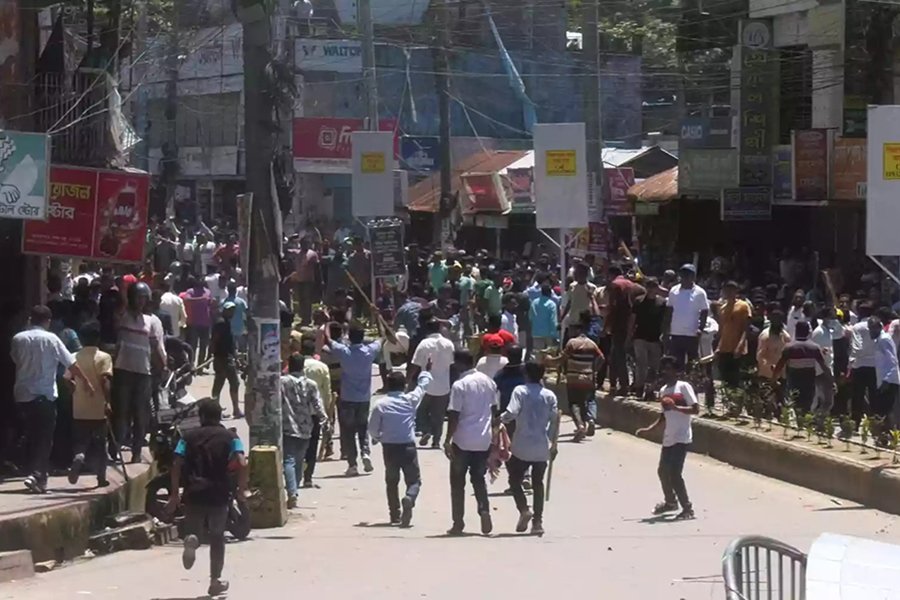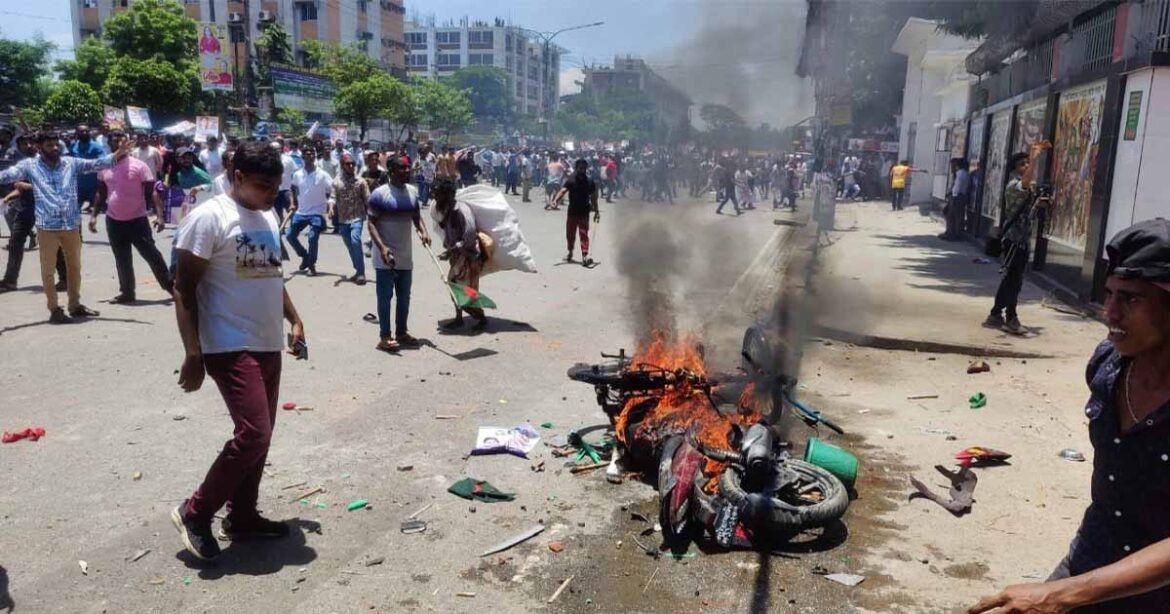Political stability is a fundamental prerequisite for the economic development of any country. Without political stability, achieving economic progress becomes challenging
Last Tuesday, widespread clashes unfolded throughout the country, including in Dhaka, involving the police, local leaders from BNP, and AL. These clashes are centered on the ‘one-step’ movement led by BNP, with the objective of overthrowing the government.
In different parts of the country, confrontations between BNP leaders, activists, and the police have taken place. They have engaged in pursuits, thrown bricks at the police, and clashed with each other, all stemming from the police’s attempts to keep discipline in the march and protest. To regain control of the situation, the police resorted to using rubber bullets, tear gas shells, and shotguns. Numerous leaders and members from both sides sustained injuries during the clashes.
You can also read: Violence in Political Demonstrations: A Threat to Democracy and Stability?
As the upcoming national election approaches to be held next January, tensions between the two rival alliances are escalating, leading to an increased likelihood of further clashes in the days to come. Unfortunately, the political landscape in Bangladesh has been unable to keep up with the country’s development.
The occurrence of politically motivated violence has significant economic consequences. Beyond the direct impact on the victims, it hampers investment across various sectors. The fear of violence compels millions of people to leave their homes each year, subjecting them to severe hardships.
Political violence instils fear, which exacerbates the impact of individual attacks. As fear spreads, citizens may question the government’s ability to provide security, resulting in additional adverse economic effects. Violence in one area ripples through the entire country, affecting economic activities elsewhere. This demonstrates how fear influences residents’ spending patterns.
Political Unrest and Historical Impedance
Since gaining independence in 1971, a significant amount of time has passed, yet our desired economic success remains elusive. Political stability is a fundamental prerequisite for the economic development of any country.
Without political stability, achieving economic progress becomes challenging. Unfortunately, due to the exploitative practices of the former rulers of Pakistan, this country has struggled to achieve substantial economic development.
Despite the parliamentary terms being completed by the elected governments after 1991, the country has experienced political unrest, strikes, blockades, and other disturbances throughout this period. These multifaceted economic, political, and social problems have hindered the pace of development in our nation.
In 1996, when Sheikh Hasina’s Awami League government came into power, efforts were made to revive the ideology of the liberation war. Bangladesh implemented strategies focused on poverty alleviation, social security provisions, reducing economic disparities, and bridging the gap between production growth and distribution policies. The period from 1996 to 2001 marked a return to the modest character of the state system envisioned by Bangabandhu Sheikh Mujibur Rahman.
However, in 2001, the ruling government formed by the BNP-Jamaat coalition took Bangladesh backward, undoing the progress that had been made. Particularly during the coalition government’s tenure, Bangladesh witnessed a surge in militancy and the marginalization of non-communal political forces, leading to the emergence of a de facto communal system. These circumstances have caused some in the developed world to label Bangladesh as a ‘failed state’.

On the Highway of Developed Country
A turning point arrived with the December 29, 2008 elections when the Grand Alliance, led by Sheikh Hasina, envisioned a transformative path for Bangladesh in various aspects such as socio-economic, political, education, culture, science, and technology. The people voted in favor of the grand coalition, propelling them to victory.
From 2009 onward, Bangladesh embarked on a journey of revolutionary changes in the socio-economic field, despite facing numerous challenges. Under Sheikh Hasina’s leadership, the government spearheaded significant transformations across various sectors, including power generation, agriculture and food production, fisheries, and the garments industry.
Ambitious infrastructure projects such as the construction of the Padma Bridge, Rooppur nuclear power plant, Payra seaport, Matarbari power plant, deep-sea port, Karnaphuli tunnel, and the metro rail system were undertaken. These endeavours have propelled Bangladesh from being a low-income country to a middle-income country, marking remarkable progress achieved within the last century.
The global COVID-19 pandemic has posed significant challenges to the development and prosperity of the world. Remarkably, Bangladesh has achieved a growth rate of 5.15% amidst the pandemic. Many countries around the world had concerns about potential food shortages and the spread of the virus in Bangladesh, fearing severe consequences.
Bangladesh successfully averted such crises, earning recognition as a role model for development in the eyes of many nations. This achievement can be attributed to the visionary and mission-driven leadership of Sheikh Hasina, who has established Bangladesh as a global example of progress.
No Option of Going Backward
Sheikh Hasina has set an ambitious goal of transforming Bangladesh into a developed country by 2041. Moreover, by envisioning the year 2100 as a distant milestone, she aims to make Bangladesh one of the most advanced and prosperous nations globally.
Such steadfast goals eliminate the possibility of hunger, poverty, and backwardness, ensuring that Bangladesh continues its rapid development as a state. This endeavour aligns with the dream of Bangabandhu Sheikh Mujibur Rahman, the father of the nation.
However, amidst the country’s journey of development, clashes, vandalism, and property damage in the name of movements can hinder progress. It is crucial to avoid such conflicts and clashes for the sake of the country’s development and the well-being of its people. Let us strive to prevent any regression and spare the people from the burdens of poverty, ensuring that Bangladesh continues to move forward on the path of advancement.


